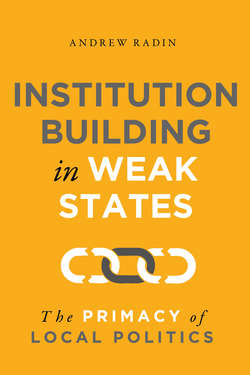Читать книгу Institution Building in Weak States - Andrew Radin - Страница 11
На сайте Литреса книга снята с продажи.
WHAT IS INSTITUTION BUILDING?
ОглавлениеThis book studies foreign-supported institution building, meaning efforts by an organization outside a given society to improve a state institution within that society. These efforts are often led by foreign countries or organizations but can also be initiated by domestic actors. In describing these efforts, I adopt a frame of reference from within the target society, so I refer to the countries or international organizations pursuing institution building as foreign or international actors. I call the individuals or groups within the society domestic or local actors. I use the terms “institution building” and “reform” interchangeably.
By state institution, I mean an organization that is part of the state and provides a particular function of governance, such as the police, customs administration, education system, or central governing bodies. The book’s case studies examine reform of the central government, police, and military. These three state institutions are consistently the focus of international efforts as they are believed to facilitate the maintenance of peace and to be fundamental for ensuring internal and external security, the development of democracy, and basic services.8 Nevertheless, as discussed in the conclusion, the domestic opposition theory likely applies to efforts to reform other state institutions as well.
In studying state institutions, I consider both the people within the organization and the rules that shape their behavior. For example, defense reform may include recruiting new personnel, changing the formal structure of the military or Ministry of Defense, altering formal rules or legislation, buying new equipment, or training personnel in its use. By improving a state institution or achieving success at reform, I mean making the institution more effective, accountable, or law-abiding, as I explain below.
There is an important distinction between my definition of a state institution as a part of the state and the use of the term “institution” by many works to describe a set of widely agreed-on rules or a stable pattern of behavior. Daron Acemoglu and James Robinson, for example, describe the development of inclusive political and economic institutions, such as laws permitting anyone to open a business, as fundamental for prosperity.9 Francis Fukuyama also identifies three basic institutions that are associated with highly developed modern democracies: the state, the rule of law, and an accountable government.10 My usage follows the practices of many organizations that pursue institution building—the US Defense Security Cooperation Agency, for example, refers to its efforts to support military bureaucracies as “defense institution building.”11
The state institutions studied here are closely connected to, but distinct from, the broader institutions described by scholars such as Acemoglu, Robinson, and Fukuyama. For example, a society may have a police force that is effective at fighting crime and accountable to the population, even if the overall state is weak and the government is autocratic. Or, vice versa, broad institutions within the society could be strong, but a particular state institution could be weak. Nevertheless, in general, the quality of state institutions is expected to contribute to the overall quality of the broad institutions within that society and, hence, political and economic development. The potential impact of state institutions on political and economic development points to the importance of better understanding when and how the United States and its partners can indeed build stronger state institutions abroad.
